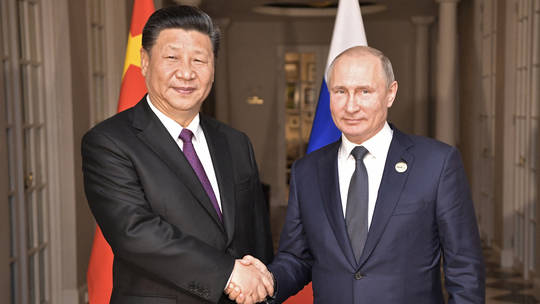What the West fails to understand about BRICS
06.08.2023 18:00
 What the West fails to understand about BRICS
What the West fails to understand about BRICS
Photo: Alexey NIKOLSKY / SPUTNIK / AFP
According to one recent Financial Times article, this has made BRICS a proxy for China’s own rivalry with the US, with Beijing dragging its partners into the confrontation. The author goes on to describe the group in highly condescending terms, saying it’s built on little more than “resentment” and “defiant rhetoric” against the “rich world.”
Commentary like this fails to understand BRICS or its goals. Accusing China of trying to force alignment on countries which still want neutral or favourable ties with the West misses the whole point. BRICS is evolving to become a forum for the developmental interests of countries in the Global South. It has nothing to do with ideological or military alignment, but has everything to do with allowing these countries to secure the political space to further their own development through the creation of a multipolar environment, and to bypass the limitations of the Western model, which leverages the growth of countries based on an exclusive set of ideological and strategic terms and conditions.
To understand this, one needs to understand that the development of a country is not straightforward. It is easy to invoke the right-wing myth that “socialism is a failure” and that certain countries in the Global South bear the sole responsibility for their own poverty or disarray. It is more complicated than that. In order for any business to succeed, you need capital and markets, and of course you can only get capital and markets where they already exist. As it happens, for the past four hundred years the allocation of global capital and markets have been dominated by an exclusive set of countries (the West) who attained their positions through violence and exploitation, and subsequently allow access to their wealth on conditions favourable to themselves.
This means that countries in the Global South are unable to develop unless they subserviate themselves to the political order and rules set by the West, which are heavily rigged against them in order to keep that established capital and wealth in the same place. Now, while there are some countries who successfully made the transition from poverty to wealth, such as South Korea, it was only done by becoming subservient to the US and thus sacrificing national sovereignty and strategic autonomy. On the other hand, nations who choose to rebel against the Western order, especially larger ones, such as Iran, find the route to their development forcibly blocked as they are deprived of the capital and export markets which the West provides.
Therefore, the development options of the Global South countries have been traditionally blocked by the Western domination of the global financial system. However, the world is now changing. The US made the strategic mistake of integrating China into the global economy under the belief that free-market economics would herald its ideological transformation to meet America’s terms and conditions, but it did not. Now, China is rising, which has created a political space for Global South countries to establish their economic development outside of the bubble dominated by the West. This has been the primary driver of things such as the Belt and Road Initiative (BRI). Of course, the US has now responded to this shift in the global currents by seeking to suppress the rise of China, demonstrating what lies ahead for any developing nation if it tries to develop on its own terms.
In this new geopolitical environment, the strategic significance of BRICS has increased primarily because it represents a club for Global South countries to cooperate in shaping an economy of the future outside of Western domination. This is not, as the Financial Times misleadingly depicts it, a “China-led bloc” precisely because it is based on the tradition of non-alignment. Thus, while the FT tries to argue that Brazil seeking greater trade ties is a contradiction, or point out India’s own disputes with China, this is misleading. BRICS is not about an “either/or” choice, but about working to establish a multipolar environment precisely to counter the domination the West currently exerts. Hence, China itself is not even truly against ties with the West, but rather specifically against the US’ attempt to undermine them. While organisations such as NATO are zero-sum alliances designed to supplement the strategic goals of the US, and therefore advance an ideological mission, BRICS is more pragmatic and practical. Hence, many nations have applied to join it because it is an alternative to these Western-dominated institutions.
